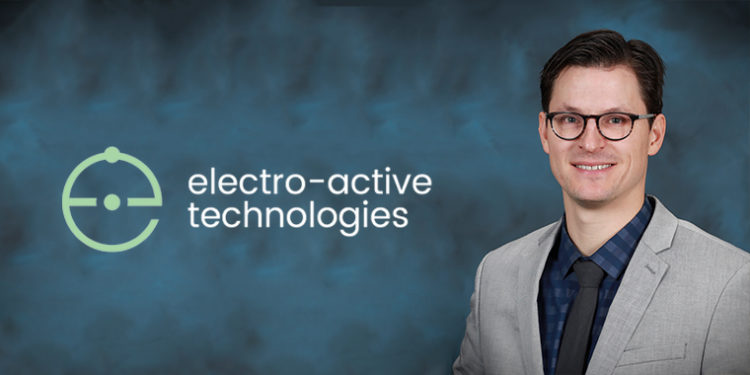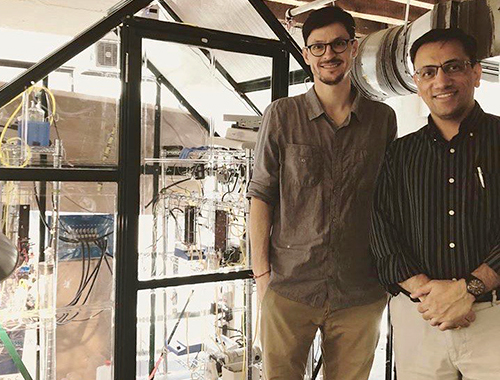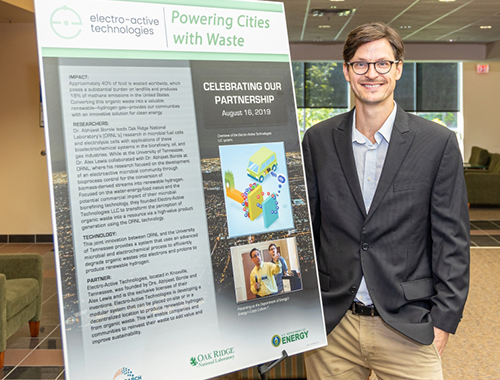
Harnessing the power of communities can achieve great things, both in academia and the petri dish.
Just ask the University of Tennessee’s Alex Lewis, whose interdisciplinary education in biology, energy science, and engineering led to the cofounding of Electro-Active Technologies, a revolutionary startup making low-cost, renewable products from organic waste streams.
Originally from Northern California, Alex came to East Tennessee for the unique opportunity to pursue a PhD in Energy Science and Engineering at the Bredesen Center for Interdisciplinary Research, which unites the assets of the University of Tennessee and Oak Ridge National Laboratory (ORNL). With undergraduate studies in biology, Alex was particularly interested in applications of microbial communities.
The Bredesen Center connected him with the UT Center for Renewable Carbon, where researchers work on technologies to render crops into usable biofuels. The processes take place in biorefineries, and leave behind a large waste product of carbon.
 Advised by Chemical and Biomolecular Engineering Research Professor Abhijeet Borole, Alex set about looking for ways to save this carbon waste to make valuable, usable products like hydrogen. The biggest problem the team encountered was of special interest to Alex: Biorefinery waste is complex and toxic, even to the microorganisms needed to degrade it.
Advised by Chemical and Biomolecular Engineering Research Professor Abhijeet Borole, Alex set about looking for ways to save this carbon waste to make valuable, usable products like hydrogen. The biggest problem the team encountered was of special interest to Alex: Biorefinery waste is complex and toxic, even to the microorganisms needed to degrade it.
In search for a solution to this problem, the partners set about evolving a new community of microorganisms that could stomach it, filtering out the weak and unresponsive while enriching and adapting the strong. They developed new technologies inside a novel dual-sided system: On one side, the special community of bacteria work together to break down waste into protons and electrons, which are sent to the other side and reacted to form hydrogen gas.
The initial innovation succeeded in creating a diverse microbial community as well as enabling the conversion of waste into hydrogen gas, usable as a fuel source.
After graduating from the Bredesen Center in 2017, Alex co-founded Electro-Active Technologies to make a business of producing renewable products from organic waste.
That’s when Alex and co-founder Dr. Abhijeet Borole widened the scope of their research: If microbial communities can adapt to take on biorefinery waste, what other more pressing possible applications might exist?

Enter the staggering global problem of food waste. An estimated 40% of the world’s food goes to waste, in the U.S. this equates to more than 60 million tons every year. This waste has an estimated financial burden of $218 billion, with the vast majority going into trash cans and landfills each year. That’s not only wasteful, it’s actively harmful: Food waste in landfills is one of the leading sources of methane emissions, and 25 times more potent than CO2. As a result, food waste became the microbial feedstock of choice for the new technologies.
Alex compliments UTRF for their guidance throughout the startup’s inception and during the patenting process for his technologies: “UTRF was a critical partner to our creation of a new business and a central driver as we move forward in the commercialization process.”
“Alex’s idea was part of the inaugural NSF I-Corps South Regional program in October of 2017, where he got his feet wet in understanding customer needs,” remarks UTRF Vice President Maha Krishnamurthy. “Since that time, assisting Alex in the launch of Electro-Active Technologies has been a great experience in collaborative technology transfer and continued customer discovery. We look forward to seeing the outcome of Alex’s technologies, leveraging the many resources of UT and ORNL, with the potential to contribute to sustainability in industries and communities alike.”
Electro-Active Technologies is registered as a public-benefit corporation, and is already gaining significant ground. Earlier this year, the startup was accepted into accelerators in New York and California, and is now a member of ORNL’s Innovation Crossroads program. Additionally, the company recently secured more than $1 million in new investments for further research and expansion and will be closing their seed round around the beginning of the new year.